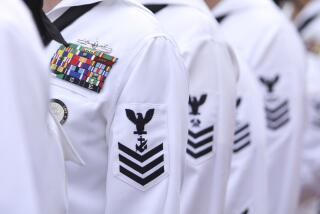Pursue Gulf War Illness Leads
- Share via
For more than two decades, the Pentagon denied that Vietnam War veterans might have been suffering from illnesses related to their exposure to toxic herbicides in Vietnam. Similarly, for years after the 1991 Gulf War the Pentagon dismissed the serious health problems of 100,000 Gulf War veterans as psychosomatic. In 1997, the Pentagon finally acknowledged that U.S. troops might have been exposed to potentially harmful chemical warfare agents, but it continues to stonewall scientists who want to medically examine veterans to unravel the mystery of Gulf War syndrome, a group of serious and debilitating apparent immune system disorders, persistent pain and chronic fatigue.
Two weeks ago, the federal watchdog agency, the General Accounting Office, issued a report suggesting that Gulf War Syndrome may be linked to a fatty substance that the military had been using as an additive to boost the effectiveness of some experimental vaccines.
The GAO quoted researchers like Bob Garry, an immunology professor at Tulane University, who has tested 400 Gulf War veterans for unusually high levels of antibodies to the booster chemical, called squalene. Garry reported that of the veterans tested, 95% of those suffering from Gulf War syndrome had unusually high levels of anti-squalene antibodies.
The GAO recommended that the Pentagon conduct its own tests, examining the blood of a much larger sample of veterans.
The Pentagon refused, saying no squalene had been administered to U.S. troops “during the Gulf War” but that leaves open the possibility that it may have been given to troops before the war began. Moreover, as the GAO points out, since the military says that many soldiers’ vaccination records have been lost, the Pentagon claim is hard to verify.
There is no proof that the Defense Department is being dishonest in insisting that it did not administer squalene. It’s highly probable that Gulf War Syndrome is many disorders with different causes and that its the mysteries of Gulf War syndrome lie more with scientists’ primitive understanding of autoimmune disorders than with an Pentagon cover-up.
But the Pentagon does not help its case by rejecting the scientists, legislators and government analysts who want to administer scientifically controlled blood tests for the antibodies in question. This would not definitively identify squalene as a cause of the syndrome, but would go a long way toward ruling it in or out as a factor. It would benefit everyone involved, for Gulf War veterans would be reassured that the Pentagon, just as it says, has nothing to hide.
More to Read
Sign up for Essential California
The most important California stories and recommendations in your inbox every morning.
You may occasionally receive promotional content from the Los Angeles Times.












